Summer interview (2): Lotte Jensen
-
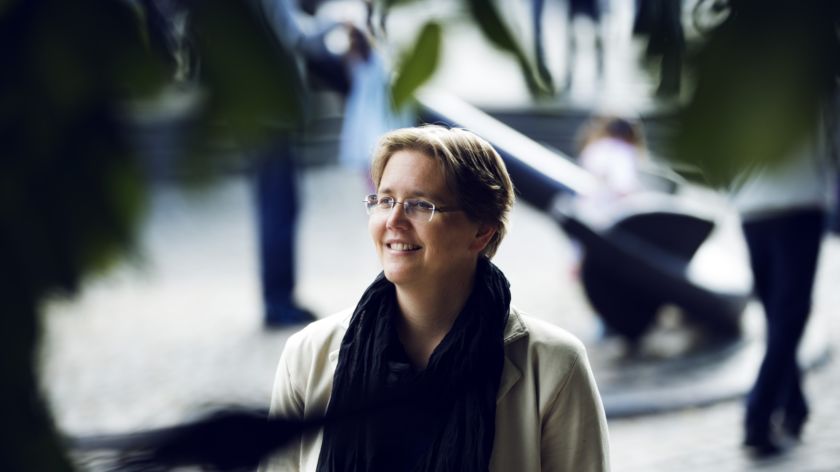 Foto's: Thomas Tolstrup
Foto's: Thomas Tolstrup
Are universities really better off with English-language Bachelor’s programmes? Lotte Jensen, Associate Professor in Dutch Literature, doubts it. She advocates preserving the Dutch-language Bachelor’s programmes. And the funny thing is: She is Danish.
King Willem-Alexander extends his hand. Lotte Jensen feels a lump in her throat. She is totally not prepared for this. Only a select group gets the opportunity to speak with the King. She knew, of course, that as a patron he would be attending the anniversary of the Dutch Literature Society on Friday 20 May, but she certainly did not expect a personal meeting.
Ok. No staring. ‘I’ve taught courses on Dutch identity,’ she tells the King, ‘at the University of the Netherlands.’ Willem-Alexander, in a dark-blue suit and orange tie, nods. And then grins widely. ‘Then you probably know that a famous Dutch person once said something on this topic?’ Ha-ha. She does know. Of course. Máxima once said – nearly ten years ago now – that there is no such thing as the Dutch. And she was right: the Dutch come in all shapes and sizes. ‘Then you probably also know,’ the King leans forward, ‘that only foreigners are allowed to make statements about Dutch identity?’ Of course. We don’t like nationalists. But now she’s got him. ‘I am Danish,’ she says.
Jordbærtærte
Lotte Eilskov Jensen (44) pricks her fork into a jordbærtærte, a strawberry pastry. Location: Café Europa, on the Strøget, the best-known shopping street in Copenhagen. The café looks out on a church tower with Danish flags flying from its spire. Red with a white Scandinavian cross, the oldest national flag in the world. We are on our way to the house of her grand-mother, farmor, as the Danish call their father’s mother (not to be confused with morfar, the mother’s father). She lives in Trondhjemsgade, the Amsterdam-Zuid of Copenhagen, less than ten minutes’ walk away from the Little Mermaid. The purpose of this walk through Copenhagen is to obtain an answer to the question of why the most vehement advocate for the preservation of Dutch-language Bachelor’s programmes on the Nijmegen campus is a Danish citizen. Because if there is one person who really fights the University Board’s plans of creating more English language Bachelor’s programmes, it is Lotte Jensen. She takes part in debates and writes editorials. Her message is always the same: it’s OK to use English in scientific publications, but let the study programmes remain in Dutch. After all, lecturers teach better in their mother tongue, and most graduates end up on the Dutch labour market anyway.
‘I don’t know a single people who are as proud of themselves as the Danes’
Last November, just before a debate with Jensen, President of the Executive Board Gerard Meijer expressed his delight at the fact that the University would be extending its range of English-language Bachelor’s from two to eight. And he is not planning to stop there: as far as Meijer is concerned, in five years’ time, half of all Bachelor’s programmes will be taught in English. Jensen remembers how nervous she was before the debate. Meijer is not only the University’s boss; he is also in many ways her counterpart: an exact sciences man, a lover of hard figures. But she was well-prepared. She always is on such occasions. ‘I didn’t find what he said particularly convincing. He was defensive and kept emphasising that this move would lead to higher student numbers. But what about the quality of our teaching?’
Proud
Lotte Jensen was ten months old when she came to the Netherlands with her mother and twin sister (now a famous philosopher, writer and television producer). Their father had already started working in his new position at the European Space Centre ESTEC. In their home in Oegstgeest father and mother Jensen recreated a mini-Denmark. A Danish au-pair took care of the twins and Danish was the only language spoken at home. Even when the twins went to school, mor and far made sure that their Danish remained up to standard. Mistakes could cost the girls pocket money.
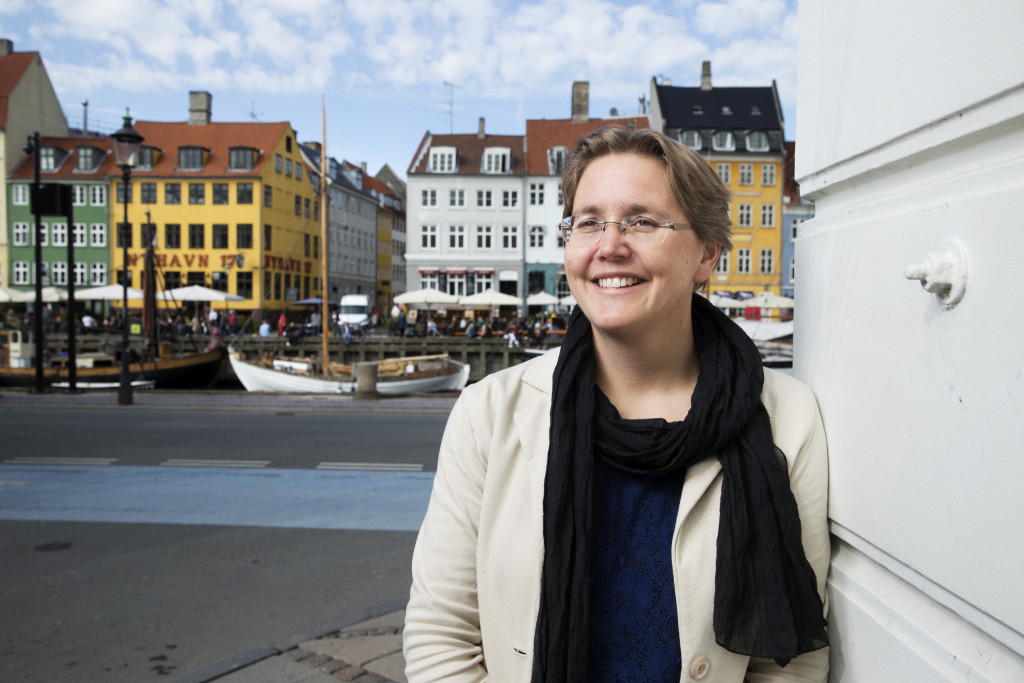
Every summer the twins flew to Copenhagen with a card around their neck. There they were met by their farmor, bearing two little Danish flags. For four weeks, all they heard was ‘Velkommen’, ‘Goddag’ and ‘Vi ses!’ Back home the twins once again spoke Danish fluently. Her Danish is no longer what it used to be, says Jensen in perfect Dutch at Café Europa. But she does still have a Danish passport. And she has no trouble communicating with the Copenhagen waiters, even though she is aware that her Danish is not like theirs. ‘I speak the Danish of my grand-mother. A kind of Polygoon Newsreel Danish.’ She still visits Copenhagen on a regular basis to see her father, who moved back there with his second wife after his retirement. Farmor passed away at the age of 97, but for Lotte, Copenhagen still breathes the spirit of her grand-mother.
Take for example the strawberries in the pastry in front of her. Strawberries, potatoes, turnip tops, her grandmother only ever bought Danish products. Why would you buy your food elsewhere when your own country produces such high quality? Her grand-mother was no exception. Danes are proud of their design, their film culture, and their mentality of mutual trust and positive attitude to life. ‘I don’t know a single people who are as proud of themselves as the Danes,’ Jensen laughs. We climb a tower, and not any tower, as it turns out. We are following in the footsteps of Jensen’s grand-mother, who used to bring the girls to the top of this building, a former observatory, more than thirty years ago. The view from the top is stunning: spires of the castles and houses owned by the many Christians and Frederiks of Denmark’s two royal families, parks and gardens with their ponds, the blue of the Sont River. ‘Look, there’s Ven Island’, Jensen points to the distance. ‘That’s where the Danish astronomer Tycho Brahe built his observatory. We named our youngest son after him.’
Vondel is amazing. Why aren’t the Dutch proud of having such a poet?
Jensen studied Dutch Literature and Philosophy at Utrecht University, in line with her grandmother’s credo: ‘You have to get the most out of your education; it’s a privilege to be allowed to study.’ Farmor herself always dreamed of studying French, but she was expected to take care of her family. Her husband, a general in the Danish army, had his hands full. In silent protest, she always had a French book lying open on her table at home – Lettres de mon Moulin by Alphonse Daudet. ‘I can see it still.’ Jensen graduated cum laude in Dutch and her philosophy thesis was published in its entirety in the History of Philosophy Journal.
Vondel
We pass a row of bright orange houses. A bus with Danish flags drives by. We hear later that today is the Crown Prince’s birthday.
The Dutch are not a proud people, unlike the Danes. ‘I simply don’t understand that there is so little attention for the Dutch language in the Netherlands. Vondel is amazing. Why aren’t the Dutch proud of having such a poet? After all, the English don’t make it a secret that Shakespeare was the greatest poet of all time. There are at present more students of Dutch abroad than in the Netherlands. Surely that’s strange!’
‘You should try living abroad; you will quickly find out what you miss about the Dutch’
Jensen has received awards (including a gold medal of honour from the Teylers Association for her study showing that the Dutch did resist Napoleon) and grants (a VIDI grant from research funding organisation NWO which she is using to fund her project on Dutch identity, entitled Proud to be Dutch). And she is making a career for herself within academia: she was recently appointed Vice Chair of the Young Academy, the national think tank for young top researchers.
She has plenty of drive; that much is clear. And she has a point when she argues that most Nijmegen lecturers are not ready to teach in English and that most students will end up working in the Netherlands. But her plea also conceals the story of someone who experienced first-hand what it is like to be uprooted. ‘You should try living abroad; you will quickly find out what you miss about the Dutch.’
”There may be no such a thing as ‘the Dutch’, but there is certainly such a thing as a collective identity’
Immigrants often have it, she notes: an awareness of the value of their own background. They are even more attached to their origins than the inhabitants of their homeland. And Danes are already so proud to begin with, so you can imagine what Danes abroad are like, she laughs. Language plays a key role in this context, because it is an ideal tool for expressing national identity. ‘At home we only ever spoke Danish, and it certainly wasn’t because we couldn’t speak anything else. The language gave us a sense of connection with our homeland.’
Jensen knows better than anyone that language is not only a communication tool, but that it also plays a role in forming people. This is a recurring theme in her research. She analyses poems, pamphlets and plays that were written at key moments in the history of the Netherlands: disasters, wars, peace negotiations. Odes to national heroes such as Michiel de Ruyter, William of Orange and Joost van den Vondel, all of which show that there is such a thing as a feeling of Dutch identity. This also applies to De Hollandsche natie by Jan Frederik Helmers, a poem published during the French Annexation (1812). Written as a poem of resistance and intended to protect the Dutch identity against invasion by the French.
There may be no such a thing as ‘the Dutch’, but there is certainly such a thing as a collective identity, says Jensen. And language plays an important role in this context. An administrator who teaches the politicians, managers and lecturers of the future to speak English is failing to understand the added value of linguistic diversity. And so he must be stopped. Nej tak (No, thanks!), as the Danes would say.

Number 4. This was farmor’s house. Jensen looks up at the fourth-floor apartment. An old-fashioned lift used to bring her to up to where it was cosy and spacious. You could just catch a glimpse of the stately embassy houses on the other side. ‘We had such good times here,’ she says softly.
From this house they visited the many city parks, went to the cinema, or ran through attraction park Tivoli, behind Rådhuspladsen. Afterwards they ate gammeldags isvaffel, a Danish delicacy made of ice-cream covered with a flødebolle, meringue with chocolate.
‘The Dutch language should not be lost!’
Jensen sees herself as a bit of a modern Helmers. ‘Because I am naturally suspicious of developments that lead to too much Anglicisation. And because I sincerely believe that someone has to protect Dutch heritage. And I believe in the importance of language diversity in general. I do feel a little like Helmers standing up to the French and saying: ‘The Dutch language should not be lost!’.’ We are walking towards Nyhavn, the canal that leads to the harbour of Copenhagen, with colourful houses on both sides. Jensen grins. ‘It’s a bit easier for me as a Dane to say these kinds of things. A Dutch person might be dismissed as nationalistic.’
‘Hej far!’ There, on Nyhavn, we run into Lotte Jensen’s father, sitting on a bench in the sun. ‘I thought you might be around here,’ says father Niels in Dutch with a strong Danish accent. On the terrace the tables are covered in white and red tablecloths. Grey blankets are draped over the chairs. ‘Skål!’ says far raising his beer glass. He laughs when his daughter tells him about her meeting with King Willem-Alexander. That’s a good opening for your story, he nods to the journalist: ‘Only foreigners are allowed to talk about Dutch identity. That means only Lotte and what’s her name… Máxima. Ha!’
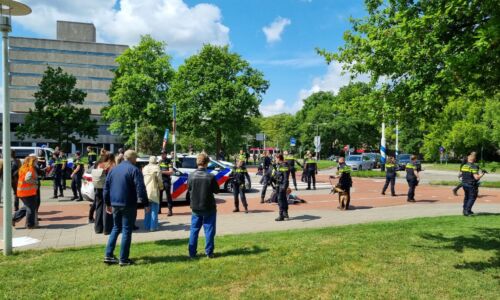
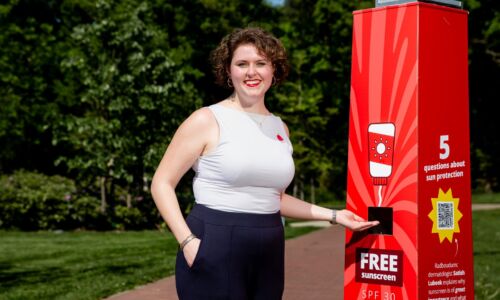
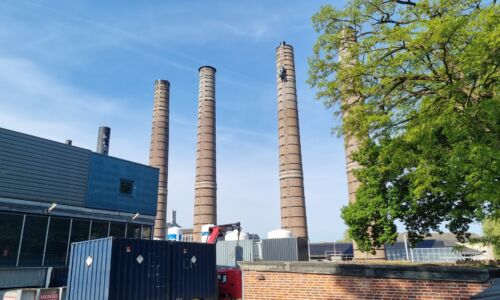

Farida Dahl schreef op 13 oktober 2018 om 14:24
Lotte Jensen: It was a pleasure to read this fantastic article – auitobiography? – I fell over this quite by accident. You see, I knew your dad – Niels Eilskov way way back in the 70’s and 80’s where I was one of the administrative personnel. He MAY, just MAY remember me.
Farida (Dahl) – if he remembers me, it will be as Farida. Do tell him I still go the Christmas lunches at the “old belovèd institute”. Old, yes that’s me too. I accidentally met Fleur, and realised that Niels had moved to Holland many years ago.
niels eilskov schreef op 13 oktober 2018 om 18:59
Dear Farida. How nice to tradition your comment. I certainly remember you very well from the time at the Laboratorium for Elektromagnetisk Feltteori. Kind regards, Niels.
farida dahl schreef op 27 april 2019 om 14:16
Thanks for remembering me Niels. How the years have flown and here we are surrounded by delightful grand children and buckets of fantastic memories.
best wishes
farida